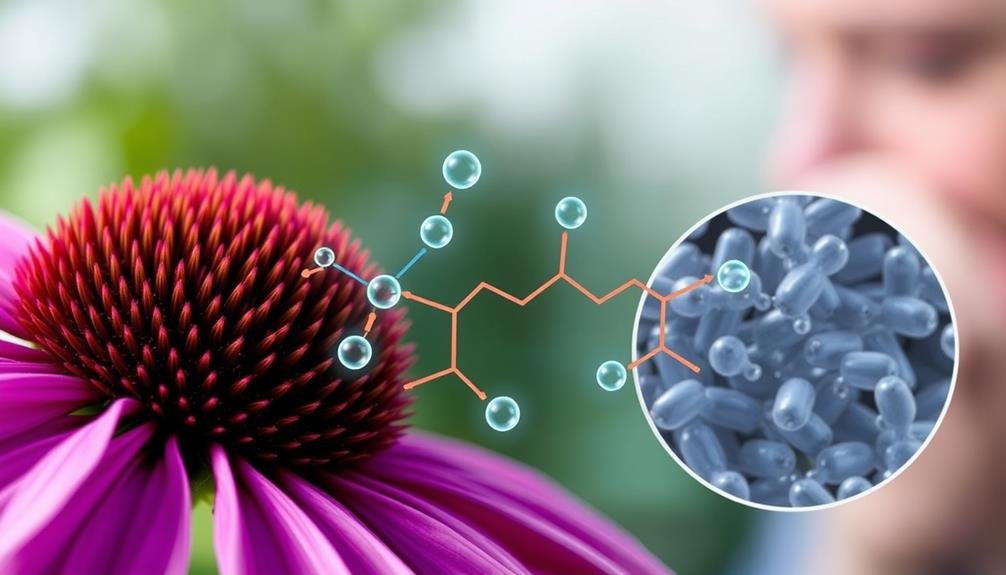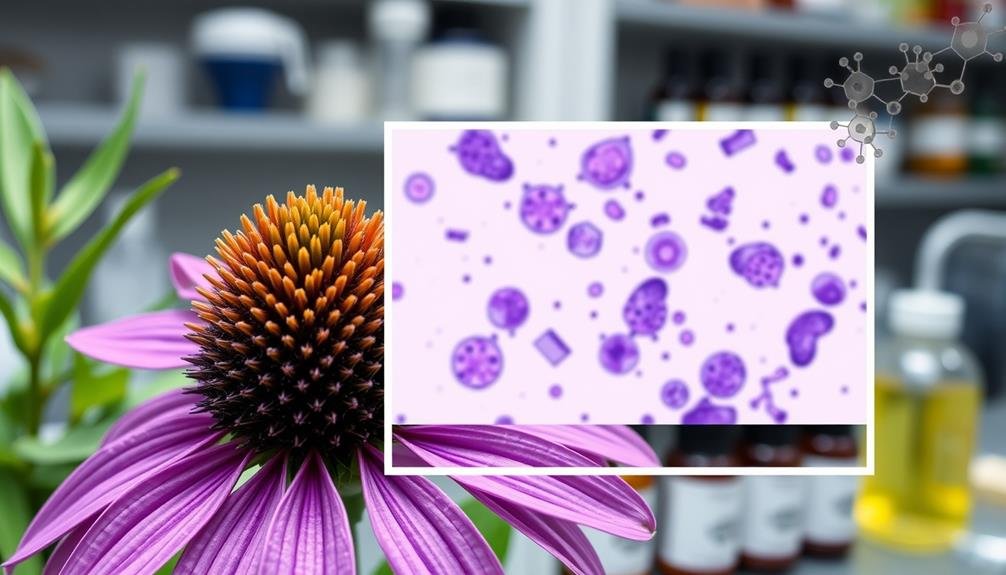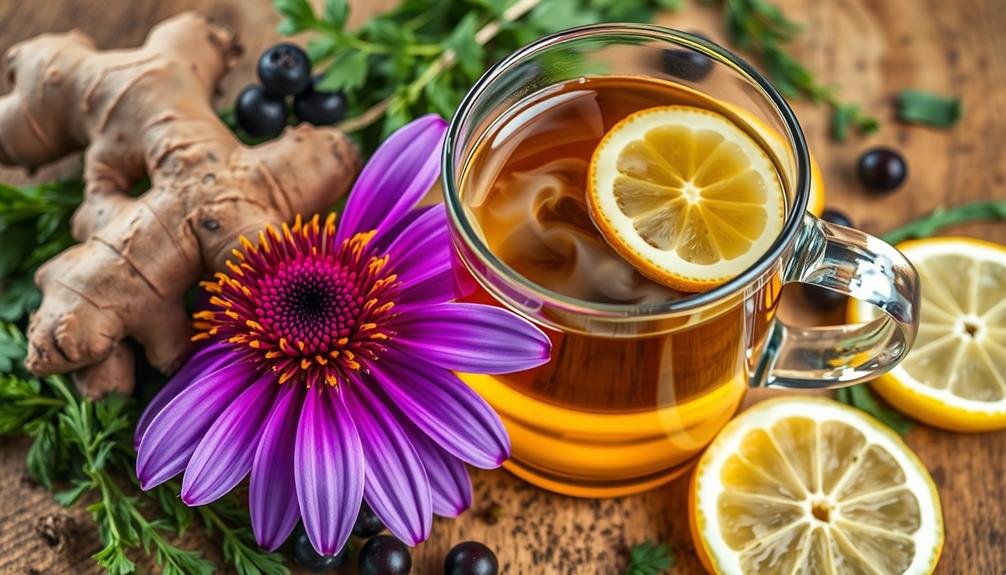Echinacea, a powerful herbal remedy, can be your natural shield against colds and flu. It's been used for centuries to boost immunity and reduce the severity of respiratory infections. With active compounds like polysaccharides and alkamides, echinacea stimulates white blood cell production and enhances your immune system's response. You'll find it in various forms, including teas, tinctures, and capsules. While scientific studies show mixed results, many people report shorter, less severe colds when using echinacea. It's generally safe, but be aware of potential side effects and interactions. To reveal the full potential of this natural defender, there's more to explore about its use and benefits.
Understanding Echinacea

From ancient Native American remedies to modern herbal supplements, Echinacea has a long history of use for boosting immunity. This flowering plant, native to North America, belongs to the daisy family and comprises nine species. The most commonly used for medicinal purposes are Echinacea purpurea, Echinacea angustifolia, and Echinacea pallida.
You'll find Echinacea in various forms, including teas, tinctures, capsules, and tablets. It's primarily known for its potential to enhance immune function and reduce the severity and duration of common colds and flu. The plant's active compounds, such as alkamides, polysaccharides, and caffeic acid derivatives, are believed to stimulate your immune system.
When you're considering Echinacea, it's important to understand its effects may vary depending on the species, plant part used, and preparation method. Research suggests it works best when taken at the first sign of illness, rather than as a long-term preventive measure.
While generally safe for most people, it's not recommended if you're pregnant, breastfeeding, or have autoimmune disorders. Always consult your healthcare provider before adding Echinacea to your wellness routine.
Historical Use of Echinacea
Echinacea's rich history stretches back centuries, with Native American tribes at the forefront of its medicinal use. These indigenous peoples discovered the plant's potential to treat various ailments, including colds, flu, and infections. They'd use different parts of the plant, such as the roots, leaves, and flowers, to create teas, tinctures, and poultices.
As European settlers arrived in North America, they quickly recognized Echinacea's value and adopted its use. By the late 19th century, Echinacea had gained popularity among eclectic physicians, who incorporated it into their natural healing practices. It became a staple in many American households, used to boost immunity and fight off common illnesses.
However, with the rise of modern pharmaceuticals in the mid-20th century, Echinacea's popularity waned in the United States. Notably, it remained widely used in Europe, particularly in Germany, where extensive research on its properties continued.
This European interest helped maintain Echinacea's reputation as a natural remedy. In recent decades, there's been a resurgence of interest in herbal medicines, including Echinacea, as people seek alternative and complementary approaches to health.
Active Compounds in Echinacea

Echinacea's effectiveness stems from its complex blend of active compounds.
You'll find polysaccharides and alkamides, which are believed to boost immune function and reduce inflammation.
Additionally, flavonoids and glycoproteins in echinacea contribute to its antioxidant properties and potential antiviral effects.
Polysaccharides and Alkamides
A symphony of active compounds works in harmony within Echinacea to produce its potential health benefits. Among these, polysaccharides and alkamides play significant roles in boosting your immune system and fighting off cold and flu symptoms.
Polysaccharides are complex sugars that stimulate your immune cells, particularly macrophages and neutrophils. These cells act as your body's first line of defense against pathogens. When you consume Echinacea, its polysaccharides can increase the production and activity of these immune cells, helping you ward off infections more effectively.
Alkamides, on the other hand, are lipophilic compounds that can easily cross cell membranes. They're known for their ability to modulate your immune response and reduce inflammation. When you're battling a cold or flu, alkamides can help alleviate symptoms by targeting inflammatory pathways in your body.
They may also enhance the bioavailability of other beneficial compounds in Echinacea, making them more accessible to your system. Together, polysaccharides and alkamides work synergistically to support your immune function.
They're part of the reason why Echinacea has gained popularity as a natural remedy for cold and flu prevention and treatment.
Flavonoids and Glycoproteins
While polysaccharides and alkamides play essential roles, flavonoids and glycoproteins are equally important active compounds in Echinacea.
Flavonoids, a group of plant pigments, contribute notably to the herb's antioxidant properties. They help protect your cells from damage caused by free radicals, potentially reducing inflammation and supporting your immune system.
Glycoproteins, on the other hand, are complex molecules composed of proteins and carbohydrates. In Echinacea, they're believed to stimulate your immune system, enhancing its ability to fight off infections. These compounds work synergistically with other active ingredients to provide a thorough defense against cold and flu viruses.
When you consume Echinacea, you're benefiting from a combination of these powerful compounds.
Here's how flavonoids and glycoproteins can help:
- Boost your immune system's response to pathogens
- Reduce inflammation in your respiratory tract
- Protect your cells from oxidative stress
- Enhance the production of immune cells
Echinacea's Immune-Boosting Properties
Echinacea's immune-boosting properties can markedly enhance your body's defense mechanisms.
You'll find that this herb stimulates the production of white blood cells, which are essential for fighting off infections.
Additionally, echinacea enhances natural killer cells and increases antibody production, further strengthening your immune system's ability to combat cold and flu viruses.
Stimulates White Blood Cells
According to numerous studies, one of echinacea's most notable immune-boosting properties is its ability to stimulate white blood cell production. When you take echinacea supplements or drink echinacea tea, you're giving your immune system a powerful boost. This herb encourages your body to produce more white blood cells, which are vital in fighting off infections and diseases.
Echinacea's impact on white blood cells is multifaceted. It doesn't just increase their numbers; it also enhances their effectiveness.
Here's how echinacea supports your white blood cells:
- Increases the production of neutrophils, a type of white blood cell that quickly responds to infections
- Enhances the activity of natural killer cells, which target and destroy virus-infected cells
- Boosts the production of T-lymphocytes, essential for coordinating immune responses
- Stimulates macrophages, which engulf and destroy harmful microorganisms
Enhances Natural Killer Cells
How does echinacea specifically target our body's natural defense system? It enhances the activity of natural killer (NK) cells, a vital component of your innate immune response. These specialized white blood cells are your body's first line of defense against viruses and other pathogens.
When you take echinacea, it stimulates the production and activation of NK cells. These cells then patrol your body, identifying and destroying infected or abnormal cells before they can multiply and cause illness. Echinacea's compounds, such as alkamides and polysaccharides, interact with your immune system to boost NK cell function.
| NK Cell Function | Without Echinacea | With Echinacea |
|---|---|---|
| Production Rate | Normal | Increased |
| Activation Level | Standard | Enhanced |
| Cytokine Release | Typical | Elevated |
| Target Recognition | Regular | Improved |
This enhanced NK cell activity can markedly reduce your chances of catching a cold or flu. It's also been shown to shorten the duration and severity of symptoms if you do get sick. By supporting your body's natural killer cells, echinacea helps you maintain a robust immune system, ready to fend off invading pathogens and keep you healthy.
Increases Antibody Production
Another key way echinacea bolsters your immune system is by increasing antibody production. These specialized proteins play a vital role in recognizing and neutralizing harmful pathogens like viruses and bacteria.
When you take echinacea, it stimulates your body to produce more antibodies, enhancing your ability to fight off infections.
Research has shown that echinacea can increase the production of various types of antibodies, including:
- Immunoglobulin G (IgG): The most abundant antibody in your blood
- Immunoglobulin A (IgA): Found in mucous membranes, protecting against respiratory infections
- Immunoglobulin M (IgM): The first antibody to respond to new infections
- Immunoglobulin E (IgE): Involved in allergic responses and fighting parasites
Scientific Studies on Echinacea

While echinacea's popularity has grown, scientific studies on its effectiveness for colds and flu have produced mixed results. You'll find numerous research papers examining echinacea's impact on upper respiratory infections, but their conclusions aren't always consistent.
Some studies have shown that echinacea can reduce the duration and severity of cold symptoms. A 2007 meta-analysis published in The Lancet Infectious Diseases found that echinacea decreased the odds of developing a cold by 58% and shortened the duration of colds by 1.4 days.
However, other studies have failed to demonstrate significant benefits. It's important to note that research quality varies, and factors like echinacea species, plant parts used, and preparation methods can affect results.
A 2014 Cochrane review concluded that echinacea products haven't been shown to provide benefits for treating colds, although there might be a weak benefit for prevention.
Despite mixed findings, many researchers believe echinacea's potential warrants further investigation. Current studies are exploring its effects on specific viral strains and its interaction with the immune system.
As more rigorous research emerges, you'll have a clearer picture of echinacea's true efficacy against colds and flu.
Echinacea for Cold Prevention
Many people turn to echinacea as a preventive measure against colds, hoping to boost their immune system before illness strikes. While research on its effectiveness is mixed, some studies suggest that taking echinacea regularly may reduce your chances of catching a cold by up to 58%.
However, it's essential to acknowledge that these results aren't consistent across all studies.
If you're considering using echinacea for cold prevention, here are some key points to keep in mind:
- Timing: Start taking echinacea at the first sign of symptoms or when you know you've been exposed to a cold virus.
- Duration: Most studies recommend taking echinacea for 7-10 days.
- Dosage: Follow the manufacturer's instructions, as dosages can vary depending on the product and form.
- Form: Echinacea is available in various forms, including tablets, capsules, tinctures, and teas.
Echinacea for Flu Symptom Relief

When you're battling the flu, Echinacea may offer relief from some of its most uncomfortable symptoms.
This herbal remedy can help reduce fever and alleviate pain, potentially shortening the duration of your illness.
Additionally, Echinacea's immune-boosting properties might enhance your body's natural defenses against the flu virus, making your recovery smoother and quicker.
Reducing Fever and Pain
In addition to its potential for prevention, echinacea may help reduce fever and alleviate pain associated with flu symptoms. When you're feeling under the weather, this natural remedy might provide some relief. Echinacea's anti-inflammatory properties can help lower your body temperature and ease discomfort.
To maximize echinacea's fever-reducing and pain-relieving benefits:
- Start taking it at the first sign of symptoms
- Choose a high-quality supplement or tea
- Follow the recommended dosage on the product label
- Combine it with other natural remedies like ginger or honey
While echinacea isn't a substitute for over-the-counter pain relievers, it can complement your flu-fighting regimen. Its ability to boost your immune system may indirectly contribute to fever reduction and pain relief by helping your body combat the virus more effectively.
Shortening Flu Duration
Echinacea's potential to shorten the duration of flu symptoms has garnered significant attention in recent years. Studies suggest that taking echinacea at the first sign of flu symptoms may help reduce the illness's duration by 1-4 days. This herb works by boosting your immune system, enabling your body to fight off the virus more efficiently.
To maximize echinacea's effectiveness, you'll want to start taking it as soon as you notice flu symptoms. The recommended dosage varies depending on the form you're using:
| Form | Dosage | Frequency | Duration |
|---|---|---|---|
| Liquid extract | 2.5 ml | 3x daily | 5-10 days |
| Capsules | 300-500 mg | 3x daily | 5-10 days |
| Tea | 1 cup | 2-3x daily | 5-10 days |
| Tincture | 1-2 ml | 3x daily | 5-10 days |
Boosting Immune Response
The herb's ability to boost immune response is a vital factor in echinacea's effectiveness against flu symptoms. When you take echinacea, it stimulates your body's natural defense mechanisms, helping you fight off the influenza virus more efficiently.
This immune-boosting effect can lead to reduced severity and duration of flu symptoms.
Echinacea works by:
- Increasing the production of white blood cells, which are essential for fighting infections
- Enhancing the activity of natural killer cells, boosting your body's ability to target and destroy virus-infected cells
- Stimulating the production of interferons, proteins that help prevent viruses from replicating
- Activating your body's complement system, a part of your immune system that helps eliminate pathogens
Different Forms of Echinacea
Various forms of echinacea are available on the market, each offering unique benefits and methods of consumption. You'll find echinacea in capsules, tablets, and liquid extracts, making it easy to incorporate into your daily routine.
Capsules and tablets are convenient for those who prefer a quick, tasteless option, while liquid extracts allow for faster absorption and flexible dosing.
If you enjoy herbal teas, you can opt for dried echinacea flowers, leaves, and roots to brew your own immune-boosting beverage. For a more potent option, you might consider echinacea tinctures, which are concentrated liquid extracts preserved in alcohol. These can be added to water or juice for easy consumption.
Echinacea is also available in topical forms, such as creams and ointments, which are primarily used for wound healing and skin conditions. Some health food stores even offer fresh echinacea plants, allowing you to grow your own supply at home.
When choosing a form of echinacea, consider your preferences, lifestyle, and specific health needs. It's important to follow the recommended dosage instructions on the product label or consult with a healthcare professional for personalized advice.
Recommended Dosage and Usage

When considering echinacea supplementation, it's crucial to understand the recommended dosage and usage guidelines. The appropriate dosage can vary depending on the form of echinacea you're using and your specific health needs. Generally, adults can take 300-500 mg of dried echinacea root or herb, or 2.5 mL of liquid extract, three times daily.
For best results, follow these usage tips:
- Start taking echinacea at the first sign of cold or flu symptoms.
- Continue use for 7-10 days, or until symptoms subside.
- Take echinacea with food to minimize potential stomach upset.
- Consult your healthcare provider before use if you're pregnant, nursing, or have autoimmune disorders.
It's important to note that echinacea isn't recommended for long-term use. Instead, use it as needed during cold and flu season or when you feel you're coming down with an illness.
If you're using echinacea tea, steep 1-2 grams of dried echinacea in hot water for 10-15 minutes, and drink up to three cups daily. Always follow the instructions on the product label and consult a healthcare professional if you're unsure about dosing.
Potential Side Effects
Echinacea's potential side effects, while generally mild, are important to contemplate before using this herbal supplement. You might experience gastrointestinal discomfort, including nausea, stomach pain, or diarrhea. Some users report headaches or dizziness after taking echinacea.
If you're allergic to plants in the daisy family, you could have an allergic reaction to echinacea. Watch for symptoms like rashes, itching, or difficulty breathing. In rare cases, more severe reactions like anaphylaxis can occur.
Echinacea may interact with certain medications, particularly those that suppress the immune system. If you're taking immunosuppressants, consult your doctor before using echinacea.
Long-term use of echinacea isn't recommended, as it might lead to liver problems or reduced effectiveness of the supplement. Some people report feeling "jittery" or anxious when taking echinacea.
If you're pregnant or breastfeeding, it's best to avoid echinacea due to limited research on its safety in these situations.
Children may be more susceptible to side effects, so use caution and consult a pediatrician before giving them echinacea.
Combining Echinacea With Other Herbs

While understanding echinacea's side effects is important, it's equally valuable to explore how it works with other herbs. Combining echinacea with complementary herbs can potentially enhance its immune-boosting properties and provide additional health benefits.
However, it's essential to approach herb combinations with caution and consult a healthcare professional before mixing any supplements.
Some herbs that are commonly paired with echinacea include:
- Goldenseal: Known for its antimicrobial properties, it may work synergistically with echinacea to fight infections.
- Elderberry: Rich in antioxidants, it can complement echinacea's immune-supporting effects.
- Astragalus: This adaptogenic herb may enhance echinacea's ability to strengthen the immune system.
- Ginger: Its anti-inflammatory properties can work alongside echinacea to reduce cold and flu symptoms.
When combining herbs, start with small doses and monitor your body's response.
Be aware that some combinations may interact with medications or exacerbate certain health conditions. Always inform your healthcare provider about any herbal supplements you're taking, especially if you're pregnant, nursing, or have a pre-existing medical condition.
Growing Echinacea at Home
Growing your own echinacea can be a rewarding experience for gardeners and herbal enthusiasts alike. You'll find this hardy perennial relatively easy to cultivate, as it thrives in various conditions.
To start, choose a sunny spot in your garden with well-draining soil. You can sow seeds directly in spring or fall, or start them indoors 8-10 weeks before the last frost.
Space your plants about 18 inches apart to allow for proper growth. Echinacea doesn't require much maintenance, but you'll want to water regularly during dry spells. Once established, it's drought-tolerant and can withstand neglect.
You'll see beautiful purple, pink, or white flowers blooming from midsummer to fall.
Harvest the flowers, leaves, and roots when the plant is in full bloom. To dry, spread them on a screen in a warm, dark place with good air circulation. Once dried, store in airtight containers.
You can use the dried parts to make teas, tinctures, or capsules. By growing your own echinacea, you'll have a readily available supply of this potent herb to support your immune system during cold and flu season.
Echinacea Tea Recipes

Along with its medicinal properties, echinacea can be brewed into a delicious and healthful tea. You'll find that making echinacea tea at home is simple and rewarding. To create a basic infusion, steep 1-2 teaspoons of dried echinacea root, leaves, or flowers in a cup of boiling water for 10-15 minutes. Strain and enjoy hot or cold.
For added flavor and health benefits, try these echinacea tea blends:
- Immune Booster: Combine echinacea with elderberry, ginger, and a touch of honey
- Soothing Throat Soother: Mix echinacea with licorice root, marshmallow root, and a squeeze of lemon
- Invigorating Mint Blend: Pair echinacea with peppermint, lemon balm, and a sprig of fresh rosemary
- Citrus Zinger: Blend echinacea with orange peel, lemongrass, and a pinch of cayenne pepper
You can customize these recipes to suit your taste preferences.
Remember, while echinacea tea is generally safe, it's best to consult with your healthcare provider before regular consumption, especially if you're pregnant, nursing, or have autoimmune conditions.
Enjoy your homemade echinacea tea as part of a balanced approach to supporting your immune system and overall health.
Frequently Asked Questions
Can Pregnant or Breastfeeding Women Safely Use Echinacea?
If you're pregnant or breastfeeding, you should consult your healthcare provider before using echinacea. While it's generally considered safe, there's limited research on its effects during pregnancy and lactation. Your doctor can provide personalized advice based on your situation.
How Does Echinacea Interact With Prescription Medications?
You should be cautious when taking echinacea with prescription medications. It can interact with certain drugs, potentially affecting their effectiveness or causing side effects. Always consult your doctor or pharmacist before combining echinacea with other medications.
Is Echinacea Effective Against Specific Strains of Viruses?
You'll find that echinacea's effectiveness against specific virus strains isn't conclusively proven. While it may boost your immune system generally, research hasn't shown it targets particular viruses. It's best to consult your doctor for reliable antiviral treatments.
Can Children Take Echinacea Supplements?
You can give echinacea to children, but it's best to consult a pediatrician first. There are age-specific dosages, and some kids may experience side effects. Always choose child-friendly forms and follow the recommended guidelines for safety.
Does Echinacea Lose Effectiveness if Used Long-Term?
You might experience reduced benefits if you use echinacea long-term. Your body can adapt to its effects, potentially making it less effective over time. It's best to use it in short bursts when you're feeling under the weather.
In Summary
You've now learned about echinacea's power as a natural cold and flu fighter. From its rich history to its immune-boosting properties, this herb offers a wealth of benefits. Remember to consult your doctor before use, especially if you're taking medications. Whether you're brewing tea or growing it in your garden, echinacea can be a valuable addition to your wellness routine. Embrace nature's shield and stay healthy this season!





Leave a Reply